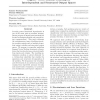17 search results - page 3 / 4 » The Complexity of Recognition of Linguistically Adequate Dep... |
ACL
2009
14 years 10 months ago
2009
We present a novel approach to deciding whether two sentences hold a paraphrase relationship. We employ a generative model that generates a paraphrase of a given sentence, and we ...
102
click to vote
CICLING
2003
Springer
15 years 5 months ago
2003
Springer
In setting up a formal system to specify a grammar formalism, the conventional (mathematical) wisdom is to start with primitives (basic primitive structures) as simple as possible...
98
Voted
ACL
2003
15 years 2 months ago
2003
We demonstrate that an unlexicalized PCFG can parse much more accurately than previously shown, by making use of simple, linguistically motivated state splits, which break down fa...
ICML
2004
IEEE
16 years 1 months ago
2004
IEEE
Learning general functional dependencies is one of the main goals in machine learning. Recent progress in kernel-based methods has focused on designing flexible and powerful input...
122
click to vote
COLING
2010
14 years 7 months ago
2010
An unsupervised discriminative training procedure is proposed for estimating a language model (LM) for machine translation (MT). An English-to-English synchronous context-free gra...

